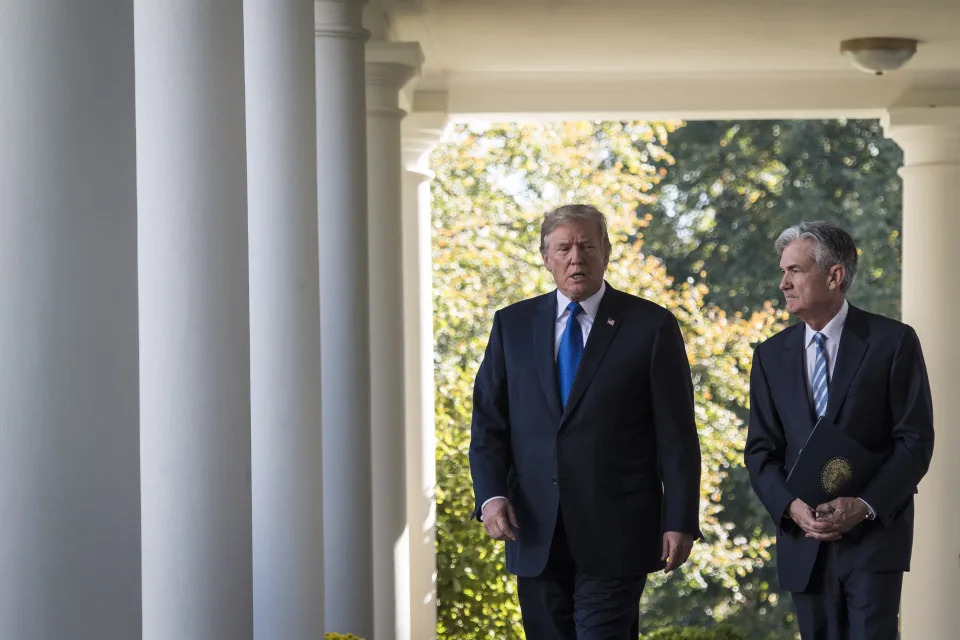President Donald Trump wasted no time criticizing the Federal Reserve after it held interest rates steady Wednesday, posting a message to his social media platform Wednesday afternoon arguing Fed Chair Jerome Powell and the central bank "failed to stop the problem they created" on inflation.
He also said the Fed "has done a terrible job" regulating banks and argued the institution had spent too much time focused on "DEI, gender ideology, 'green' energy, and fake climate change."
The president said he would address inflation by "unleashing American Energy production, slashing Regulation, rebalancing International Trade, and reigniting American Manufacturing."
"I will do much more than stopping Inflation, I will make our Country financially, and otherwise, powerful again!"
The new comments marked an escalation of what could be a coming clash between the president and the Fed over the direction of monetary policy.

Trump said last week that he would "demand" lower rates and that he thinks the Fed will listen to him. He said he expects to talk directly with Powell "at the right time." Powell said Wednesday he had not spoken with the new president.
Powell did not spend much time Wednesday talking about Trump at his press conference that followed the Fed decision to pause rates, a hold that came after three consecutive cuts at the end of 2024.
Read more: Fed rate decision: How it affects your bank accounts, loans, credit cards, and investments
"I’m not going to have any response or comment whatsoever on what the president said," Powell told reporters. "It is not appropriate for me to do so."
But it was clear from his comments that several unknowns about the economic policies of the new Trump administration could have a future effect on Fed monetary policy, forcing the central bank to remain cautious about any further actions for now.
"We don’t need to be in a hurry to adjust our policy stance," he said.
Powell cited tariffs, immigration, fiscal policy, and regulatory policy as broad areas that are still not defined as Trump 2.0 gets underway.
"We need to let those policies be articulated before we can make a plausible assessment," he said. “We are going to be watching carefully."
The range of possibilities with Trump’s tariff plans, he added, are "very, very wide," and it’s not yet known how they could filter through to US consumers.
Trump is threatening to impose tariffs on Mexico, Canada, and China as early as this Saturday, a stance that some economists predict will put upward pressure on inflation just as the central bank is trying to ensure that issue is finally under control.
Some Fed officials have aired concerns behind closed doors that the trade and immigration policies of the new Trump administration might provide more upward price pressure.
There are some signs, however, that the inflation picture is improving. The latest reading of the Consumer Price Index (CPI) showed slight progress in December after three months of holding steady.
The next reading of the Fed’s preferred inflation gauge — the Personal Consumption Expenditures (PCE) index — is out Friday.
Economists expect annual "core" PCE to have clocked in at 2.8% in December, unchanged from November . Over the prior month, economists project "core" PCE rose 0.2%, faster than the 0.1% seen in November.
While Powell was not willing to discuss Trump Wednesday, he did emphasize that he believes that an independent Fed will continue to do its work without considering politics.
"The public should be confident that we will continue to do our work as we always have, focusing on using our tools to achieve our goals, and, really, keeping our heads down and doing our work," he said.
Trump in his post Thursday accused the Fed of being distracted by DEI and "fake climate change."
The Fed recently withdrew from a global group of central banks focused on how climate change might affect the financial system. Powell said Wednesday the group’s focus was too far afield from that of the Fed.
"I'm aware of how it can look but it really was not driven by politics," he said.
Trump, in accusing the Fed of doing a "terrible job" on bank regulation, said that the Treasury department "is going to lead the effort to cut unnecessary Regulation, and will unleash lending for all American people and businesses."

